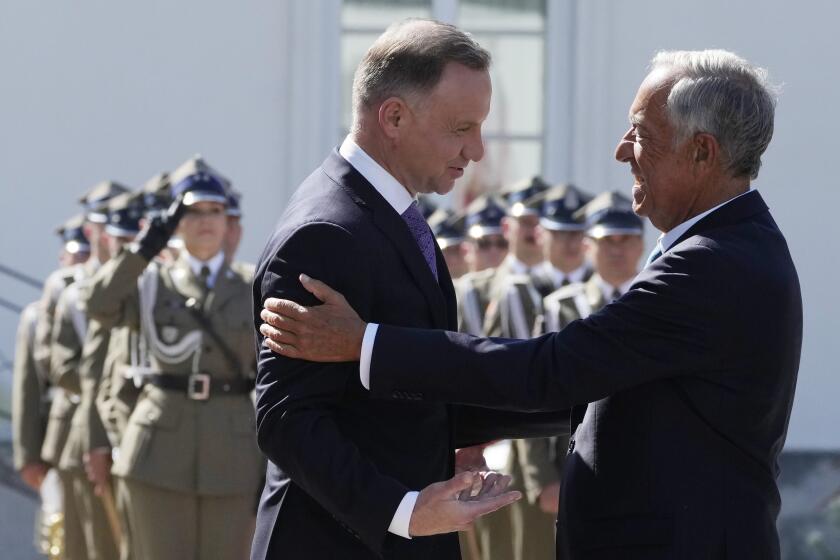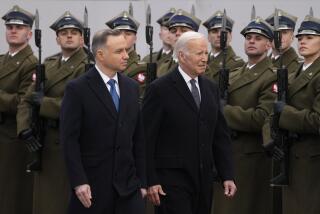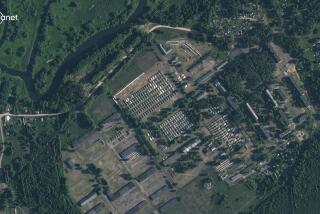U.S. and Polish officials open missile defense site that Russia has long protested

- Share via
WARSAW — U.S. and Polish officials inaugurated a NATO missile defense base in northern Poland on Wednesday, with Polish officials welcoming it as a significant step in securing the country and the alliance at a time of war in neighboring Ukraine.
The U.S. missile defense base, which is being integrated into NATO’s defenses, was originally planned under President George W. Bush as a way to protect Europe from ballistic threats from Iran. Poland, however, has always seen it as a form of U.S. protection in case of Russia aggression, fears that have grown since Russia’s invasion of Ukraine.
The Kremlin protested the plan from the start, and on Wednesday denounced the base as a challenge to its own military potential that would require measures “to ensure parity.”
Polish officials, who gathered with the U.S. ambassador and other officials, welcomed it as a historic step that increases the U.S. commitment to the security of Europe at a time of uncertainty due to the war in Ukraine. There are also concerns about President-elect Donald Trump’s commitment to Europe’s security when he returns to the White House in January.
Warsaw agrees to house 10 interceptors, a program Russia has denounced. Rice sees the pact as lasting.
“The whole world will see clearly that this is not Russia’s sphere of interest anymore,” Polish President Andrzej Duda said at the ceremony in Redzikowo. “From the Polish point of view, this is strategically the most important thing.”
Polish Defense Minister Wladyslaw Kosiniak-Kamysz called the opening of the base with its hundreds of U.S. Navy personnel “an extraordinary event in the history of the security” of Poland, the U.S. and the North Atlantic Treaty Organization. He said the conflicts in Ukraine and the Middle East are showing the importance of air defenses.
“The base in Redzikowo means the eternal presence of American and allied troops on the territory of the Republic of Poland and, strategically for Poland, it is one of the most important events in history after 1989,” he said.
The facility is equipped with the U.S. Navy’s modern Aegis Ashore system, which can detect, track and destroy ballistic missiles in the initial phase of their flight. It is the second land element of Aegis Ashore in Europe after the first such installation went into operation in Romania in 2016.
President Biden and British Prime Minister Keir Starmer are to meet Friday amid signs the two are more receptive to allowing the Ukrainians to use their arms to hit targets farther inside Russia.
Asked about the base during a news briefing Wednesday, Kremlin spokesman Dmitry Peskov said President Vladimir Putin had expressed his concerns about the U.S. plans even during the Bush administration.
“We then insisted that the Americans saying all these plans are aimed against the ephemeral Iranian threat are in fact a lie, that all these plans were drawn up from the very beginning as an attempt to militarily contain our potential,” he said.
“This is the advancement of American military infrastructure on European territory towards our borders. This is nothing other than an attempt to contain our potential. And, of course, this leads to the adoption of appropriate measures to ensure parity,” Peskov added.
Later in the day, NATO Secretary-General Mark Rutte visited Warsaw for meetings with Duda and Prime Minister Donald Tusk, another gesture of NATO unity. He praised Poland for its contributions to the alliance, including its high level of defense spending.
Poland’s President Andrzej Duda confirms that Russia has begun shifting some short-range nuclear weapons to neighboring Belarus.
“With this, you are building one of the biggest armies in NATO,” Rutte said at a joint news conference with Tusk.
Tusk, who is preparing for Poland to take over the rotating leadership of the European Union on Jan. 1, said he has been speaking with other European leaders to make sure they remain committed to Ukraine being involved in any future negotiations about its fate.
“This means that EU member states should ensure that future decisions regarding, God willing, ending the war or freezing the conflict, are made in full agreement and with the participation of the interested states, those from the eastern flank, but above all Ukraine itself,” Tusk said.
Gera writes for the Associated Press.
More to Read
Sign up for Essential California
The most important California stories and recommendations in your inbox every morning.
You may occasionally receive promotional content from the Los Angeles Times.












